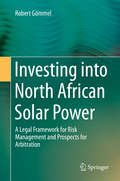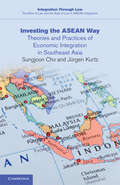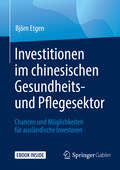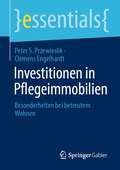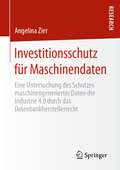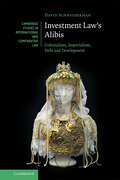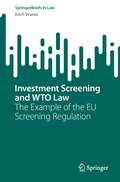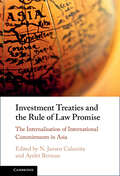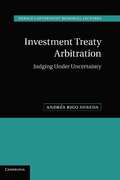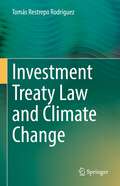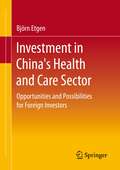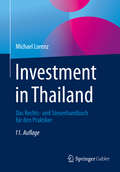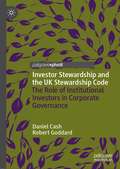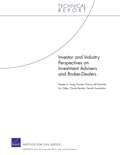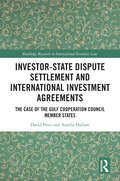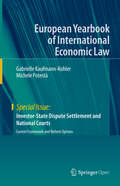- Table View
- List View
Investigative and Forensic Interviewing: A Personality-focused Approach
by Philip Erdberg Craig N. Ackley Shannon M. Mack Kristen BeyerInvestigative and Forensic Interviewing: A Personality-Focused Approach looks at the personality styles most commonly encountered in the criminal justice system and demonstrates how to use this insight to plan and conduct a productive interview. The book includes chapters on narcissistic, antisocial, psychopathic, borderline, inadequate/immature, p
Investing into North African Solar Power
by Robert GömmelThis book investigates how a North African solar thermal power plant can be set up under the guidance of European investors (e. g. the Desertec Concept) as a Public Private Partnership (PPP). It outlines the importance of early awareness of contract-related risks, investment risks and dispute settlement, arguing that commercial and investment arbitration are the best tools for settling disputes regarding a large-scale solar thermal project. Furthermore, by comparing institutional and ad hoc arbitration, it shows that the former offers highly suitable support. The latest developments in the area of investment arbitration under EU law and the general acceptance of arbitration in Islamic countries are examined in particular. This book also demonstrates that a solar thermal power plant must meet certain requirements to be considered an investment. These requirements are examined in relation to Art. 25 of the International Centre for Settlement of Investment Disputes Convention (ICSID Convention) and respective case law. Overall, the book offers valuable guidelines for investors and host states on how to successfully implement large-scale solar thermal projects.
Investing the ASEAN Way: Theories and Practices of Economic Integration in Southeast Asia (Integration through Law:The Role of Law and the Rule of Law in ASEAN Integration #19)
by Sungjoon Cho Jürgen KurtzIn recent decades, South East Asia has become one of the world's most popular destinations for foreign investment. The member states of the Association of Southeast Asian Nations (ASEAN) have employed varying modalities to pursue first security and then economic cooperation. This book explores regional law and governance in ASEAN through the lens of its regulation of foreign investment. It adopts a new framework to identify the unique ontological autonomy of the ASEAN Investment Regime beyond a simple aggregation of its individual member states. It deploys a sociology-led approach (especially constructivism) and emphasizes ideational factors (such as culture and norms) that guide state actions from within. The book explores the manner in which ASEAN's history and culture have fundamentally shaped its foreign investment policies, leading to outcomes that often depart fundamentally from the external structure and script of Global Investment Law.
Investitionen im chinesischen Gesundheits- und Pflegesektor: Chancen und Möglichkeiten für ausländische Investoren
by Björn EtgenDieses Fachbuch vermittelt erfolgversprechende Strategien für Investitionen in das zukunftsträchtige Gesundheits- und Pflegewesen der Volksrepublik China. Der chinesische Gesundheitssektor wächst stetig und die chinesische Regierung hat erkannt, dass die Beteiligung ausländischer Investoren zur Verbesserung und Weiterentwicklung des chinesischen Gesundheitswesens, insbesondere in Ballungsgebieten, unabdingbar ist. Dies eröffnet Chancen und Möglichkeiten für ausländische Gesundheitsdienstleister, deren Investitionen in zunehmendem Maße von der chinesischen Regierung begrüßt und unterstützt werden. Das Buch stellt Möglichkeiten vor, um ebenso sichere wie gewinnbringende Investitionen im chinesischen Gesundheitsmarkt zu tätigen: von der Errichtung neuer Krankenhäuser und Pflegeheime über die Einführung des erforderlichen medizinischen Equipments bis hin zur Akquise und Einstellung qualifizierter Mitarbeiter. Hierbei werden insbesondere die rechtlichen Rahmenbedingungen beleuchtet.
Investitionen in Pflegeimmobilien: Besonderheiten bei betreutem Wohnen (essentials)
by Clemens Engelhardt Peter S. PrzewieslikDas essential vermittelt kompakt das Grundwissen der vertraglichen Beziehungen zwischen Pflegeheimbetreiber und Developer bzw. Investor/Eigentümer. Es wird auf die unterschiedlichen Vertragspunkte eingegangen. Wer die Asset-Klasse Pflegeimmobilie kennt, dem ist klar, dass die rechtlichen Anforderungen nicht lediglich das klassische Mietrecht betreffen, sondern dass es hier u.a. auch aufgrund der langen Laufzeiten (25 Jahre und mehr), der Eigenschaft als „single tenant use“ sowie sozial- und verbraucherschutzrechtlicher Vorgaben besonderer Vereinbarungen zwischen dem Betreiber und dem Eigentümer der Immobilie bedarf.
Investitionsschutz für Maschinendaten: Eine Untersuchung des Schutzes maschinengenerierter Daten der Industrie 4.0 durch das Datenbankherstellerrecht
by Angelina ZierDie intelligente Produktion in der Industrie 4.0 erfordert einen stetigen Austausch sowie die Verarbeitung riesiger Mengen maschinengenerierter Daten. Deshalb sind diese Daten zu einem zentralen Produktionsmittel und Wirtschaftsgut mit erheblichem Wert geworden. Aus diesem Grund haben die datenhaltenden Unternehmen ein großes Interesse daran, ihre Daten für sich selbst gewinnbringend zu nutzen. Demgegenüber besteht wegen der immer größeren Bedeutung der Maschinendaten auch ein erhebliches Interesse am Zugang zu den Daten anderer Unternehmen. Deshalb ist ein Rechtsrahmen für maschinengenerierte Daten erforderlich, der einen hinreichenden Schutz gewährt, aber auch ausreichende Datenzugangsmöglichkeiten etabliert. Ein geeignetes Datenmanagement in der Industrie 4.0 erfordert regelmäßig die Einrichtung von Datenbanken zur Speicherung und Verarbeitung der maschinengenerierten Daten. Deshalb liegt die Anwendung des Datenbankherstellerrechts nahe, um einen rechtlichen Schutz der Daten zu ermöglichen. Die Autorin untersucht, ob das Datenbankherstellerrecht auf Industrie 4.0-Datenbanken Anwendung finden kann und welche Probleme sich dabei ergeben. Es werden Vorschläge für eine Adaption des Datenbankherstellerrechts gemacht.
Investment Implications of Selected WTO Agreements and the Proposed Multilateral Agreement on Investment
by Matthias VockeA report from the International Monetary Fund.
Investment Law within International Law
by Freya BaetensDevelopments within various sub-fields of international law influence international investment law, but changes in investment law also have an impact on the evolution of other fields within international law. Through contributions from leading scholars and practitioners, this book analyses specific links between investment law and other sub-fields of international law such as the law on armed conflict, human rights, sustainable development, trade, development and EU law. In particular, this book scrutinises how concepts, principles and rules developed in the context of such sub-fields could inform the content of investment law. Solutions aimed at resolving problems in other settings may provide instructive examples for addressing current problems in the field of investment law, and vice versa. The underlying question is whether key sub-fields of public international law, notably international investment law, are open to cross-fertilisation, or, whether they are evolving further into self-contained regimes.
Investment Law's Alibis: Colonialism, Imperialism, Debt and Development (Cambridge Studies in International and Comparative Law)
by David SchneidermanThis book aims to connect narratives associated with the past to the international regime that protects property and contract rights of foreign investors. The book scrutinizes justifications offered to sustain practices associated with colonialism, imperialism, civilized justice, debt, and development, revealing that a number of the rationales offered in support of investment law disciplines replicate those arising out of this discredited past. By revealing these linkages, the book raises concerns about investment law's premises. It would appear that the normative foundations for today's regime reproduces discursive practices that are less than compelling. The book argues that citizens deserve something more than historically discredited reasons to justify the exercise of power over them – something more than mere pretext.
Investment Property Valuation Today
by Tim HavardFirst Published in 2002. Routledge is an imprint of Taylor & Francis, an informa company.
Investment Screening and WTO Law: The Example of the EU Screening Regulation (SpringerBriefs in Law)
by Erich VranesIn recent years, there has been a worldwide intensification in the use of investment screening mechanisms. This surge is connected with political re-orientations, the rise of new economic powers, and security concerns. Despite the considerable effects that investment screening may have on international investment and trade, there is hardly any literature examining the consequences to be drawn from relevant WTO rules for investment screening. However, the importance of WTO law for such instruments is substantial not least due to the broad scopes of application of the GATT and GATS agreements. The risk that screening activities could be challenged before the WTO is underlined by pertinent panel reports. This book in particular uses the 2019 EU Screening Regulation as an example for illustrating the relevance that WTO law has for investment screening. It concludes that in the light of relevant WTO rulings screening activities undertaken for public order and security reasons may face considerable hurdles not least in the general exceptions and security exceptions of the GATT and the GATS.
Investment Treaties and the Rule of Law Promise: An Examination of the Internalisation of International Commitments in Asia
by Ayelet Berman N. Jansen CalamitaInvestment treaties are said to improve the rule of law in the states which enter into them. Fearing claims, governments will internalise international investment obligations into their decision-making processes, resulting in positive spill-over effects on the rule of law. Such arguments have never been backed by empirical research. This book presents an analytical framework for thinking about the internalisation of international commitments in governmental decision making that takes account of the complexities of governance. In so doing, it provides a typology of processes whereby international treaty obligations may be internalised by governments and identifies factors which may affect whether and to what extent international commitments are internalised in governmental decision making. This framework serves as the background for the main body of the book in which empirical case studies address whether and how a select group of governments in Asia internalise international investment treaty obligations in their decision-making.
Investment Treaty Arbitration
by Andrés Rigo SuredaInvestment claims have exposed the vague nature of the standards by which arbitral tribunals are expected to adjudicate them and the policy reasons which explicitly or implicitly have an influence. The ad hoc nature of the tribunals and the decisions reached on various controversial issues have brought to the fore the issue of consistency. Andrés Rigo Sureda's Hersch Lauterpacht Memorial Lecture examines how arbitral discretion is exercised in the face of uncertainty of the law. It explores the choices made by arbitral tribunals as they approach treaty interpretation, as they search for limits in determining jurisdiction and the content of the standards of protection and as they search for consistency in the exercise of arbitral discretion.
Investment Treaty Arbitration as Public International Law
by Eric De BrabandereInvestment treaty arbitration is fast becoming one of the most common methods of dispute settlement in international law. Despite having ancient roots, the private interests in international investment relations remain in conflict with the need for the recognition of the public international law features of the arbitral procedure. This book, which presents an account of investment treaty arbitration as a part of public international law - as opposed to commercial law - provides an important contribution to the literature on this subject. Eric De Brabandere examines the procedural implications of conceiving of investment treaty arbitration in such a way, with regards to issues such as the principles of confidentiality and privacy, and remedies. The author demonstrates how the public international law character of investment treaty arbitration derives from and has impacted upon the dispute settlement procedure.
Investment Treaty Law and Climate Change
by Tomás Restrepo RodríguezThe book deals with the question whether the investment treaty law system could be harmonized with the climate change international legal framework and the climate interest that lies beyond. The answer to this research question is divided into three parts. The first examines the relevance of the climate change international legal framework in investment treaty disputes as a natural pre(logical)interpretative stage. The second focuses on the BIT’s content-interpretation, which is the orthodox approach to solve the fragmentation between the system of investment treaty law and the system of international climate change law. Finally, the third part tackles this fragmentation through a heterodox approach that is grounded in the direct application of climate change principles through law ascertainment. Apart from concluding that harmonization between investment treaty law and international climate change law is possible through the orthodox approach to the expropriation and the FET standards, as well as through the direct application of the climate change precautionary principle and the CBDRRC principle − heterodox approach, the book suggests that tribunals are expected soon to openly address climate change disputes in their rulings.
Investment in China's Health and Care Sector: Opportunities and Possibilities for Foreign Investors
by Björn EtgenThis reference book provides promising strategies for investing in the promising healthcare and nursing sector of the People's Republic of China. The Chinese healthcare sector is growing steadily, and the Chinese government has recognized that the participation of foreign investors is essential to improve and develop the Chinese healthcare system, especially in metropolitan areas. This opens up opportunities and possibilities for foreign healthcare providers, whose investments are increasingly welcomed and supported by the Chinese government. The book presents ways to make safe and profitable investments in the Chinese healthcare market: from the construction of new hospitals and nursing homes to the introduction of the necessary medical equipment and the acquisition and recruitment of qualified staff. In particular, the legal framework conditions are highlighted.This book is a translation of the original German 1st edition Investitionen im chinesischen Gesundheits- und Pflegesektor by Björn Etgen, published by Springer Fachmedien Wiesbaden GmbH, part of Springer Nature in 2019. The translation was done with the help of artificial intelligence (machine translation by the service DeepL.com). A subsequent human revision was done primarily in terms of content, so that the book will read stylistically differently from a conventional translation. Springer Nature works continuously to further the development of tools for the production of books and on the related technologies to support the authors.
Investment in Thailand: Das Rechts- und Steuerhandbuch für den Praktiker
by Michael LorenzDieses Buch bietet Praktikern einen essenziellen Überblick über das aktuelle thailändische Wirtschaftsrecht. Thailand gehört heute zu den wirtschaftlich attraktivsten Hubs in Südostasien und wirbt als etablierter Wirtschaftsstandort erfolgreich um Auslandsinvestitionen – mit guten Voraussetzungen für europäische Investoren.Rechtsanwalt Michael Lorenz erläutert anschaulich alle wesentlichen thailändischen Regularien, um Unternehmen, Organisationen, Investoren, Juristen und interessierten Laien rasche Orientierung bei der Klärung grundlegender rechtlicher, steuerlicher und wirtschaftlicher Fragen zu bieten. Die 11. Auflage wurde vollständig überarbeitet und auf den aktuellen Rechtsstand Januar 2019 gebracht.Darüber hinaus gibt das Werk dem Leser weiterführende Informationen an die Hand, die für westliche Investoren relevant sind, und beleuchtet interkulturelle Gegebenheiten des Wirtschaftslebens. Zahlreiche Beispiele illustrieren die Bedeutung für die Praxis.
Investments Unlimited: A Novel About DevOps, Security, Audit Compliance, and Thriving in the Digital Age
by Jason Cox John Willis Helen Beal Bill Bensing Michael Edenzon Topo Pal Caleb Queern John Rzezotarski Andres VegaSusan Jones had been the CEO of Investments Unlimited, Inc. (IUI) for five years, a financial institution that has successfully navigated their digital transformation. She is quick on her feet and is trusted by the board. But right now—although you can't tell from her demeanor—she was panicking. Today, IUI received notice from bank regulators concerning their unsatisfactory audit and compliance practices. If they failed to address the regulators' concerns within the year, the company could go up in smoke. She didn't understand. How had her team let this happen? How had she let this happen? Over the past several years, IUI had executed a digital transformation strategy following the business accelerating principles of Agile and DevOps. By any metric they had seemingly done things right. Feedback from customers was astounding and conversion rates for new accounts was growing faster than ever. But along the way IUIs manual governance process had become inundated with friction, frustration, and failure for the teams attempting to deliver value for their organizations. Now, it's all hands on deck for a cross-functional team of executives and engineers to develop a modern automated governance process that satisfies regulators without slowing the company's ability to meet customer demands and compete in the market.In the vein of bestselling titles The Phoenix Project and The Unicorn Project, Investments Unlimited helps organizations radically rethink how they handle audit, compliance, and security for their software systems. By introducing concepts, tools, and ideas to reimagine governance, this book catalyzes a more humane way to enable high-velocity software delivery that inspires trust and is inherently more secure.
Investor Oriented Corporate Social Responsibility Reporting
by Jane Thostrup JagdReporting organizations' corporate social responsibility activities is difficult - a lack of regulation means that the communication of these activities varies significantly and there is a multitude of ways in which mistakes can be made. The author provides the tools and insights required to produce investor-friendly CSR reports and includes a chapter showing how the investors can integrate CSR in their quantified analysis of investment-opportunities. Features include formulas, conversion standards and CSR note tables which enable the book to be used as a practical handbook as well as in the classroom. Written by an experienced compliance officer with years of experience in reporting CSR, this book is an easy-to-follow guide for practitioners and students and will be required reading for students of accounting, financial reporting and auditing as well as those in industry who want to improve their organization's reporting standards.
Investor Stewardship and the UK Stewardship Code: The Role of Institutional Investors in Corporate Governance
by Robert Goddard Daniel CashThis book provides a critical assessment of the development of the Stewardship Code 2020, which sets out principles regarding the role of institutional investors in corporate governance. It discusses how the regulatory framework for stewardship evolved before and after the financial crisis, and how that evolution resulted in the 2020 Code. It then critiques the Code from a practical and academic perspective, as well as evaluating the wider regulatory framework; in particular, the position of the FRC (ARGA). The book concludes by offering insight into different pathways that the evolution of stewardship may continue to take. Stewardship Codes modelled on the U.K.’s original 2010 version have been introduced in numerous markets and as such the book will be relevant for an international audience of academics, regulators and policymakers in financial regulation, investment regulation and financial services.
Investor and Industry Perspectives on Investment Advisers and Broker-Dealers
by Claude Berrebi Noreen Clancy Eric Talley Angela A. Hung Jeff DominitzIn theory, financial professionals are relatively distinct: A broker-dealer conducts transactions in securities on behalf of itself and others; and an investment adviser provides advice to others regarding securities. Different laws regulate each type of professional, but boundaries have blurred. This report examines current business practices and investor understanding of each type.
Investor-State Dispute Settlement and International Investment Agreements: The Case of the Gulf Cooperation Council Member States (Routledge Research in International Economic Law)
by David Price Amelia HallamThis book examines the international investment agreements and the dispute settlement mechanisms contained therein, which bind the Gulf Cooperation Council member States.The Gulf Cooperation Council (GCC), comprising Bahrain, Kuwait, Oman, Qatar, Saudi Arabia, and the United Arab Emirates, is complex and unique. Recently, all member States have experienced increasing investor–state arbitration claims, while their nationals are increasingly instituting investor–state arbitrations to protect their own foreign investments. Intra-GCC disputes, though relatively rare, have also appeared, largely as a result of the recent Gulf crisis. While focussing particularly upon the investor–state dispute settlement experience of member States as respondents, the book also explores the experiences of their nationals as claimants to determine how they can approach investor– state dispute settlement in the future. The book also reflects on existing treaty-making practices, making recommendations for regional-level dispute settlement to improve upon investor–state dispute settlement outcomes.This book provides a detailed analysis of the global investor–state dispute settlement regime and international investment agreements, and it will be of interest to students, academics, and practitioners with an interest in international investment law and arbitration.
Investor-State Dispute Settlement and National Courts: Current Framework and Reform Options (European Yearbook of International Economic Law)
by Gabrielle Kaufmann-Kohler Michele PotestàThis open access book examines the multiple intersections between national and international courts in the field of investment protection, and suggests possible modes for regulating future jurisdictional interactions between domestic courts and international tribunals. The current system of foreign investment protection consists of more than 3,000 international investment agreements (IIAs), most of which provide for investment arbitration as the forum for the resolution of disputes between foreign investors and host States. However, national courts also have jurisdiction over certain matters involving cross-border investments. International investment tribunals and national courts thus interact in a number of ways, which range from harmonious co-existence to reinforcing complementation, reciprocal supervision and, occasionally, competition and discord. The book maps this complex relationship between dispute settlement bodies in the current investment treaty context and assesses the potential role of domestic courts in future treaty frameworks that could emerge from the States’ current efforts to reform the system.The book concludes that, in certain areas of interaction between domestic courts and international investment tribunals, the “division of labor” between the two bodies is not always optimal, producing inefficiencies that burden the system as a whole. In these areas, there is a need for improvement by introducing a more fruitful allocation of tasks between domestic and international courts and tribunals – whatever form(s) the international mechanism for the settlement of investment disputes may take.Given its scope, the book contributes not only to legal analysis, but also to the policy reflections that are needed for ongoing efforts to reform investor-State dispute settlement.
Invisible Atrocities: The Aesthetic Biases of International Criminal Justice
by Randle C. DeFalcoInternational criminal justice is, at its core, an anti-atrocity project. Yet just what an 'atrocity' is remains undefined and undertheorized. This book examines how associations between atrocity commission and the production of horrific spectacles shape the processes through which international crimes are identified and conceptualized, leading to the foregrounding of certain forms of mass violence and the backgrounding or complete invisibilization of others. In doing so, it identifies various, seemingly banal ways through which international crimes may be committed and demonstrates how the criminality of such forms of violence and abuse tends to be obfuscated. This book suggests that the failure to address these 'invisible atrocities' represents a major flaw in the current international criminal justice system, one that produces a host of problematic repercussions and undermines the legal legitimacy of international criminal law itself.
Invisible Crimes and Social Harms
by Pamela Davies Peter Francis Tanya WyattThis unique collection explores the continuing invisibility of much crime and victimization, and the lack of adequate responses to them. Shaping the lens through which criminology and victimology is approached in the twenty-first century, the volume examines major issues including (in)justice, risks, rights, regulation and enforcement.

